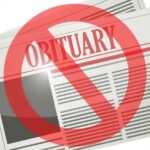David Morales Colon was murdered last month in San Juan, Puerto Rico. He was 22 and loved motorcycles.

In 1964, Ed Headrick reworked a wobbly flying toy called the Pluto Platter to form the Frisbee. More than 300 million have been sold since then. His dying wish was that his ashes be molded into Frisbees.
His family, carrying out what they considered was a last wish, presented him in an unconventional posture for his wake: in tight black jeans, a black cap and dark shades, atop a fiery orange Honda motorcycle.
Dying wishes can be an artistic statement, a political statement or realize an ambition never fulfilled in life. Oftentimes, they are absurd.
In 1964, Ed Headrick added aerodynamic ridges to an unreliable wobbly flying toy called the Pluto Platter and created the modern Frisbee. By the time Headrick died in 2002 nearly 300 million Frisbees had been sold. His dying wish was that his ashes be molded into commemorative Frisbees and passed out to family and friends. “When we die, we don’t go to purgatory,” said Headrick. “We just land up on the roof and lay there.”
Fredric Baur, an organic chemist and food storage technician from Cincinnati, Ohio invented the tube-shaped packaging that made Pringles possible. His dying wish was to bury part of his cremated remains in one of these cans. When he died two years ago, his children carried it out.
The poet Donald Russell requested that upon his death his skin be used to cover one of his books. This wish was never honored; it violated laws on the use of human remains.
Mark Gruenwald, the Marvel comic book editor who helped produce The Avengers, Spider Woman and Captain America was a prankster, so much so that when he died of a heart attack in 1996 his friends assumed it to be a practical joke. His dying wish was that his ashes be mixed with ink and used to print the first trade paperback compilation of Squadron Supreme, a comic starring Doctor Spectrum, Nighthawk and the Whizzer.
Alan Duncan, a 30 year-old British war hero who died last month of lung and brain cancer, had been planning his own funeral for over a year. His final wish was that his friends come to his funeral dressed up as “Star Wars” characters and superheroes. They did. In attendance were Han Solo, Chewbacca, Princess Leia, Darth Vader, Spider-Man, Batman and the Joker.
The master magician Harry Houdini died abruptly in 1926, as a result of a ruptured appendix. In his will was a final wish that instructed his wife Bess to hold a séance every Halloween following his death in order to give him a chance to contact her from beyond the grave. Before his death they had agreed upon a code that Houdini would whisper in her ear so she knew it was him and not an imposter. Bess held the séances for a decade, posh parties packed with starlets and reporters, but Houdini never appeared. “Ten years is long enough to wait for any man,” Bess said. But Houdini aficionados continued the séance for decades in front of his grave at the Machpelah Cemetery in New York City, until the management stopped the event due to excessive vandalism. Last year, a séance was held online.
The remains of Gene Roddenberry, the creator of Star Trek, were sent into space in 1997 aboard an American Pegasus rocket launched from an island off the coast of Morocco. Roddenberry’s cremated remains along with those of 23 other people, including the 1960s drug icon Timothy Leary, were on the craft, locked into aluminum capsules. Sometime in 2012 Celestis, the same company that shipped Roddenberry, will fulfill his wife’s final wish by launching her remains into space to join his.
One of the strangest and most controversial last wishes was that of T.M. Zink, an Iowa attorney who passed away in 1930. His will left his daughter a measly five dollars but directed that $35,000 be placed in a trust fund that after 75 years would be used to build the Zink Womanless Library. Not only would the library contain no books written by women, it would not allow women in the front (or back) door. His daughter successfully challenged the will and the library was never built. Ultimately, his estate fell into her hands.









